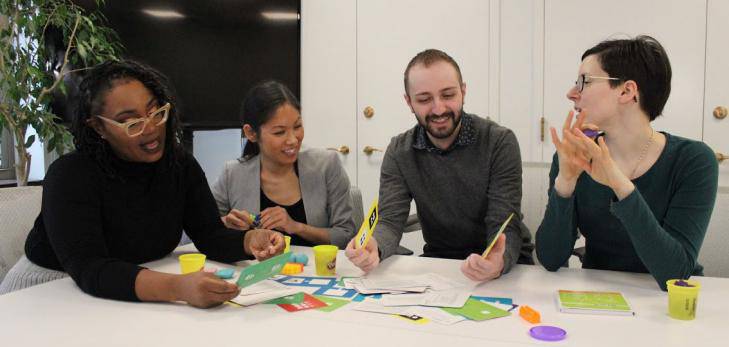Throughout TSNE’s journey to become a learning organization, we have consistently strived to center equity at the core of our work. As TSNE continues this forever journey, we’ll share how we have worked to imbue equity throughout our learning and evaluation work, by first acknowledging our own biases and the limitations of traditional nonprofit evaluation, and then designing inclusive learning spaces, and centering those we serve.
Acknowledging Our Own Biases and the Limitations of Traditional Evaluation
To center equity in our learning and evaluation work, we had to center equity in our professional selves. This demanded that we acknowledge how traditional nonprofit evaluation has been used as a punitive tool against under-resourced and marginalized communities. Evaluation has been used to judge communities’ progress towards funders’ pre-determined measures of success and is often myopic in its scope. Consequently, traditional evaluation fails to present data in context, perpetuating stereotypes and ignoring systemic inequities. We are committed to reflecting on how we’ve been complicit in promoting the false myths of evaluation’s “objectivity” and “expertise.” Simply being women of color doesn’t make us immune to the inherent power, privilege, and problems of traditional nonprofit evaluation. After reflecting and owning our past actions, our team did intentional work to understand how to analyze data and conduct evaluations in service of equity. At TSNE we are now beginning to openly share and discuss employees’ paygrades, promotions, and turnover by race. Additionally, we now analyze disaggregated data in order to understand how different constituents by race, gender, and age experience our services. We are resolute in freeing ourselves from the prevailing orthodoxies of evaluation in the nonprofit sector. This requires that we continue to acknowledge our biases and limitations while reimagining how evaluation can be in service of equity.
Designing and Facilitating Inclusive Learning Spaces
We design and facilitate inclusive learning spaces that celebrate diverse learning styles and encourage collective meaning making amongst those most impacted by our work. At TSNE, we regularly hold learning sessions: in-person conversations where staff and constituents collectively make meaning of data and rethink ways to strengthen our work. In these spaces, we present data in different mediums and invite individuals to draw, build, write, and speak their reflections. Additionally, we honor the wisdom in the room and encourage individuals to collectively make meaning of the data by identifying trends, themes, and gaps. This practice inspires those closest to the work to put the data into context and decide for themselves what is important within the information — an act that contrasts with traditional assumptions that evaluators are the only “experts”.
Centering Those We Serve
In traditional nonprofit evaluation, evaluators and funders wield enormous power in deciding the definitions of success and the valid ways of knowing. As TSNE strives to center equity in our learning and evaluation work, we remain committed to shifting these entrenched power-dynamics by continuously centering those we serve. Our Learning Board leads our Learning Lab, which designs, tests, and iterates potential new solutions that address the needs of alternative-structured and/or under-resourced organizations. We continuously work to co-create measures of success, use jargon-free language, and present data in an accessible manner so that all individuals can fully participate. For example, we summarize key learnings in conversational language, supported by data points, as a way to share program results instead of writing expansive technical reports.
Resources for Equitable Learning and Evaluation
In the coming months, the Learning and Evaluation team will share more information about TSNE’s journey to becoming a learning organization. These blog posts will explore how we’re practicing these core principles in our evolving work, our challenges, and other aspects of our journey. Similar to becoming a learning organization, centering and strengthening equity in our work is an ongoing journey. We’ve found the following resources useful as we continue on our path.
- Doing Evaluation Differently by Sally Leiderman
- Racial Equity Tools Getting Ready for Evaluation
- The Equitable Evaluation Initiative
- Awake To Woke To Work: Building a Race Equity Culture by Equity in the Center
This blog post is part of a series about our Learning and Evaluation team. Read the first in the series, Our Journey to Becoming a Learning Organization: TSNE’s Three Core Principles of Continuous Learning.
